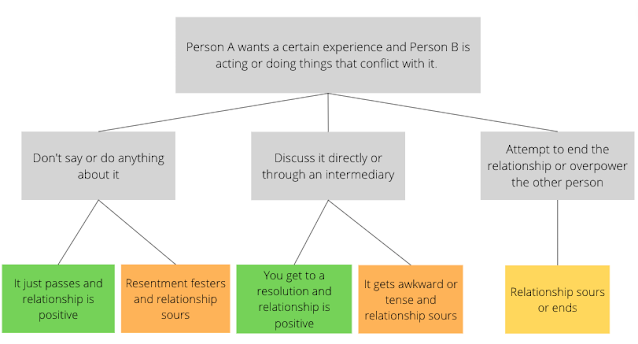Handling conflicts
Recently I have been hearing stories of conflict among friends, family members, and colleagues. The pattern is similar - one person or group behaves in a way that doesn't meet another person's or group's expectations, and they get annoyed, but most don't address it healthily, eventually creating conflicts that harm the relationship. We all have different lives and therefore expectations, perceptions, behaviors, and quirks, so these sorts of mismatches are inevitable.
You can try to reduce conflicts by lowering your expectations (be more accepting) and spending more time with those who are compatible with your expectations. But those aren't always options or foolproof, and you may miss out on the joy of healthy relationships, so you must also learn to deal with conflicts and "fight well" when they arise.
So what can you do when there's a conflict?
The first question is whether you care for the relationship. If you or the other party don't care for the relationship (a difficult judgment call), you can try to end it or reduce it. Life is short, after all. But if you care for the relationship, you can either let it pass or discuss it.
Then you need to decide if you want to address the situation or not. You can consider letting it pass if you think this isn't very consequential and the other party doesn't have harmful intent. But in other cases, letting it pass will cause a slow build-up of resentment that'll cause you suffering and eventually show up in your mind and demeanor, and hurt the relationship.
And finally, if you have to address it, you must do it tactfully. These "crucial conversations" can be awkward and hard and require tact. You need to create safety for the other person, show kindness, care, and empathy, share with clarity and vulnerability (you did/said ... which made me feel ... or resulted in ...), and also be ready to change your mind or meet halfway.


